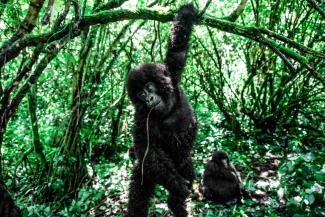The Congo Basin contains the world’s second largest contiguous rainforest. It is unequalled in its biodiversity, with a rich array of wildlife including many species found nowhere else in the world. It is also the second largest global “sink” for carbon, the most important gas implicated in global warming.
The forests are an important source of food, building materials, shelter, energy and medicine for approximately 80 million people who live in the region. The lack of economic alternatives for the local inhabitants, large populations of internally displaced people as a consequence of armed conflicts and the expected doubling of the population over the next 20 years are increasing pressures to clear forests.
Deforestation, forest degradation, and biodiversity loss due to habitat destruction and the bushmeat trade, environmental destruction from civil and military conflicts, and growing global demand for food, fiber, minerals, petroleum and other resources (mining), are combining to create significant and growing threats.
USAID’s support in the region is focused on addressing these threats by building the capacity of local, national, and regional organizations to mitigate climate change and to improve management of natural resources, sustain biodiversity and ecosystem services that benefit local communities, the countries and the world.

